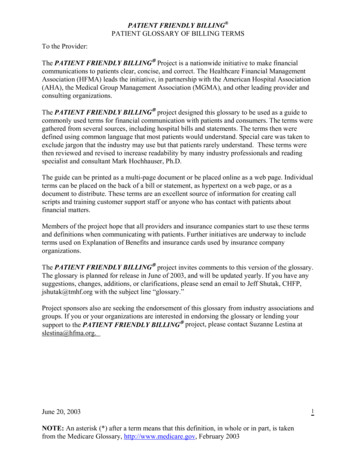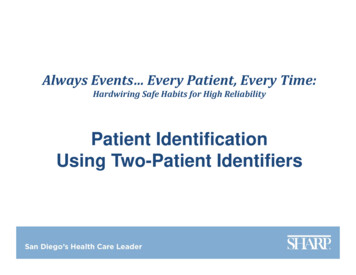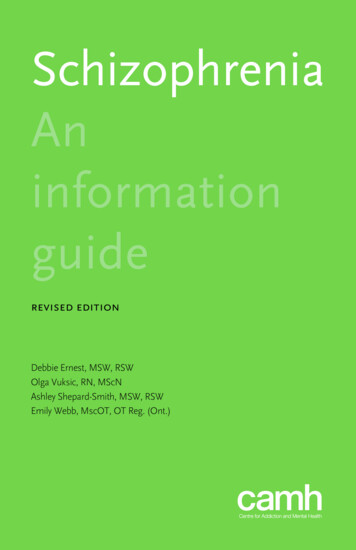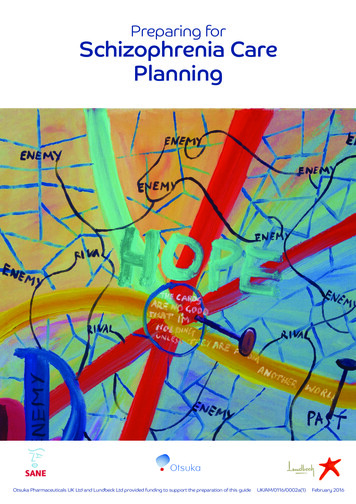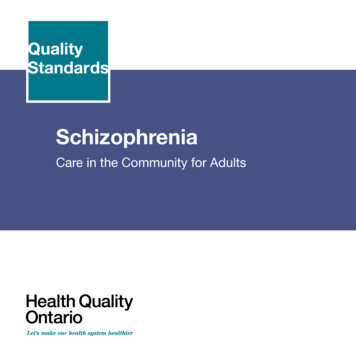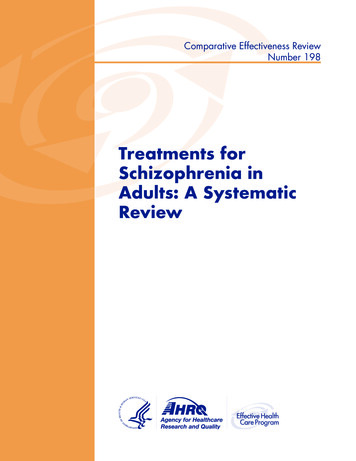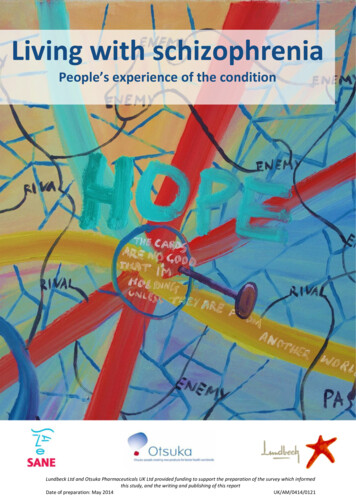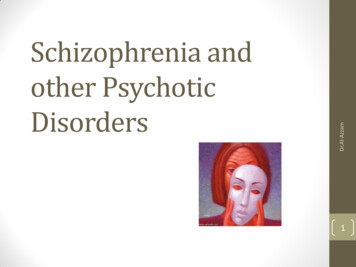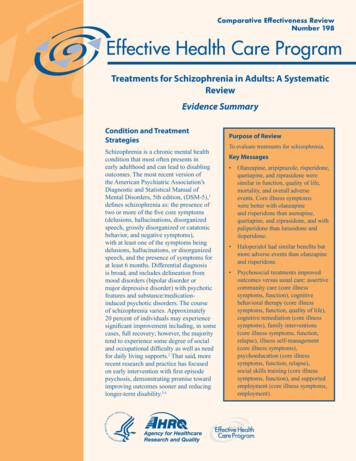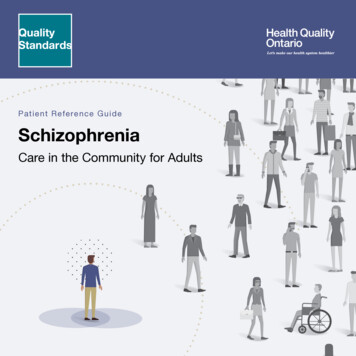
Transcription
Patie nt Refe re nce G ui deSchizophreniaCare in the Community for Adults
Quality standards outline what high-quality care looks like. They focus onconditions or topics where there are large variations in how care is delivered,or where there are gaps between the care provided in Ontario and the carepatients should receive.This guide addresses variations and gaps in care in Ontario that need attentionwhen it comes to care in the community for people with schizophrenia. It isbased on the best available evidence and was created in partnership withpeople with schizophrenia, their families, and health care professionals.The quality standard, available on our website, contains moreinformation. You can find it at hqontario.ca.In this guide, we use the following terms:Care in the community: Includes primary care,Health care professional: The many types ofhospital outpatient care, rehabilitation, correctionalpeople who may be part of your health care team,facilities, and community supports and services.which may include:Caregiver: Someone who provides unpaid careand support for you, such as family members,friends, or anyone else you identify.Family: The people closest to you, includingparents, a significant other, children, siblings,friends, or personal supports. You define who yourfamily is and how they will be involved in your care. Psychiatrists Primary care providers, such as a familydoctor or a nurse practitioner A nurse, occupational therapist,pharmacist, physiotherapist, psychologist,or social workerRecovery: Living a satisfying and hopeful life,even when there may be ongoing symptomsof schizophrenia.
This guide is for people with schizophrenia, their families,and their caregivers. It can help you know what to ask forwhen receiving care in the community and to make sure youreceive the highest-quality care.Schizophrenia is a chronic mental health condition that usually begins in late adolescence or earlyadulthood. There is no cure for schizophrenia, but many people can “recover.” “Recovery” is aterm commonly used by the mental health community. It means you are able to live a satisfyingand hopeful life, even when you may be experiencing ongoing symptoms of your illness.You and your family don’t have to do this alone. Your health care professional will want to help youlive the best life you can, and to build a relationship of trust with you and your family. The morethey know about you and your goals, the better they can help create a plan for treatment andrecovery that meets your needs.If you or someone you care about has schizophrenia and isreceiving care in the community.You can use this guide to work with your health care professionalto develop a care plan that works for you, including access toculturally appropriate care. We encourage you to use this guideto ask informed questions about schizophrenia care, and to learnmore about how you and your family can get the supports youneed.Care plans can be very different for each person, so it isimportant to work closely with your health care professionalto create a care plan that works for you.Here are some things to consider.Schizophrenia Care in the Community for Adults 1
Who Will Provide My Care? Depending on where you live and your needs,you might have a health care team or onehealth care professional providing your care. A health care team is a group of health careproviders who work together to care for you.Your care team may include doctors, nurses,social workers, occupational therapists,volunteers, peer support workers, or spiritualcare providers.2 Schizophrenia Care in the Community for Adults If you do have a health care team, they shouldprovide you with the name and contact informationfor the person who is coordinating, communicating,and providing your care on an ongoing basis. Thisincludes when information about your care is beingshared with other members of the health care teamand between health care settings (such as betweena hospital and your family doctor’s office).What Is a Care Plan? A care plan is a written document between youand your health care professional that you agreeto. It describes your goals, the care and servicesyou will receive, and who will provide them. Yourhealth care professional should work with you toupdate your care plan regularly, and your family orcaregivers can be involved in making and updatingthe plan, if you agree. Your care plan should be informed by a thoroughassessment of your physical and mental health.This will include questions about your medicalhistory and what medications you are taking.It also should look at your social situation, yourgoals, how you are feeling, and how you are copingwith the impact of symptoms on your daily life. As part of your regular appointments, yourhealth care professional should assess you forhealth problems that are common in people withschizophrenia, such as diabetes, weight gain, heartdisease, and lung disease. These assessmentsmight result in changes to your care plan.
What Is a Community Treatment Order? A community treatment order is a legal order, issued by a physician, to providea comprehensive plan for community-based treatment or care for a person witha serious mental illness who has had difficulties maintaining their mental healthin the community. If you are on a community treatment order, your care plan and goals will be usedto inform your community-based treatment plan, whenever possible.What Could My Treatment Include? Your physician or nurse practitioner should offer both antipsychotic medicationand nondrug interventions, as needed, to treat your symptoms. Depending on your needs, your health care professional may connect you withspecialized services in the community. There are various options such as:‒‒ An early psychosis intervention program if you are experiencing schizophreniafor the first time. Psychosis is a treatable condition that affects your mind andcan result in difficulty deciding what’s real and what’s not.‒‒ Something called “assertive community treatment.” This is a team of healthcare professionals working together to provide you with various services tomeet your needs—such as medications, counselling, life skills, and housingand employment supports.‒‒ Something called “intensive case management.” This is similar to assertivecommunity treatment, but in this instance a case manager is at the coreof your supports, connecting you to services to meet your needs, such asmedication support, mental health programs, and housing, employment,life skills, and justice services.These services are designed to help you to live in the community, manage yoursymptoms, and reach your goals.Schizophrenia Care in the Community for Adults 3
Antipsychotic Medication Antipsychotic medication reduces the intensityof psychotic symptoms, including hallucinationsand delusions. Your health care professionalshould discuss with you the potential benefits,harms, and side effects of antipsychoticmedication so that you can make informeddecisions about your care together. If you havefamily or others involved in your care, theyshould also receive this information.Usually, a health care professional will offer oneantipsychotic medication at a time. However,there might be times when they recommendmore than one antipsychotic medication.If your symptoms don’t get better or youexperience significant side effects whentaking an antipsychotic medication, talk toyour health care professional about switchingto a different medication.You may want to take your antipsychoticmedication as a long-acting injection so youdon’t have to remember to take it every day.Your health care professional should talk withyou early in your treatment about whether thiswould be a good option for you. Dependingon the medication, you would get an injectionevery 2 weeks to every 3 months. Not allantipsychotic medications can be given asa long-acting injection.4 Schizophrenia Care in the Community for Adults If you have tried at least two differentantipsychotic medications and your symptomscontinue to be distressing, talk with your healthcare professional about taking a medicationcalled clozapine. If an antipsychotic medication works to makeyour symptoms better, you will likely needto keep taking it to prevent symptoms fromrecurring. Your health care professional shouldreview your medication with you once a year tomake sure it continues to work for you and toaddress any side effects.Nondrug Interventions You should be offered nondrug interventionsas part of your treatment, based on yourneeds. Two types are cognitive behaviouraltherapy and cognitive remediation. In cognitive behavioural therapy, you wouldtalk with a therapist about your thoughts andbeliefs and learn how they can affect the wayyou behave and deal with problems. In cognitive remediation, you wouldperform learning activities that help youimprove your memory, concentration,and problem-solving skills.
How Can I Live Well With Schizophrenia? A healthy lifestyle can help improve yourphysical and mental health. Your health careprofessional should give you information aboutprograms that help you exercise and eathealthy foods. Alcohol and drugs may make yourschizophrenia symptoms worse and makeyour treatment less effective. Your health careprofessional should ask if you use alcohol anddrugs and offer you treatment (if you need it) tohelp you stop using them. Quitting or cutting down on smoking can helpimprove your physical and mental health. Yourhealth care professional should talk with youabout ways to stop smoking or smoke less. It’s easier to focus on your recovery when youdon’t have to worry about having somewhereto live. Your health care professional shouldconnect you with services that can help youfind a safe, affordable, stable place to live, aswell as support services (such as medicationmanagement, income supports, mealpreparation, assertive community treatmentor case management, and recreational andsupport activities), if you need them. Your health care professional should talk withyou about programs that could help you toachieve your goals for work and education.How Can I Learn MoreAbout Schizophrenia? Your health care professional should giveyou information to help you learn aboutschizophrenia and your treatment optionsto manage your condition so you canbe actively involved in developing yourcare plan. You should also be giveninformation about support servicesand groups that are available in yourcommunity and online.Schizophrenia Care in the Community for Adults 5
I’m a Family Member—What Can I Do to Help? This guide was created with families in mind, too, to give you the information you need to askinformed questions of your family member’s health care professionals. Families can play a vitalrole in supporting a person’s recovery, promoting their well-being, and providing care. If you are a family member of someone who has schizophrenia, the health care professionalsshould give you opportunities to learn about schizophrenia and to get support if you need it.This is important so you can help your family member while also looking after your own needs.Everybody is different, and someoptions may not apply in yoursituation. If you have questions aboutyour care, it is important to speakwith your health care professional.6 Schizophrenia Care in the Community for Adults
NotesSchizophrenia Care in the Community for Adults 7
Looking for More Information?Please contact us at qualitystandards@hqontario.ca or 1-866-623-6868if you have any questions or feedback about this patient reference guide.The quality standard, available on our website, contains more information.You can find it at hqontario.ca.About Health Quality OntarioHealth Quality Ontario is the provincial advisor on the quality of health care.We are motivated by a single-minded purpose: Better health for all Ontarians.Our quality standards are concise sets of statements outlining what quality carelooks like for conditions or topics where there are large variations in how care isdelivered, or where there are gaps between the care provided in Ontario and thecare patients should receive. They are based on the best available evidence andare developed in collaboration with clinical experts from across the province,and patients and caregivers with lived experience with the topic being discussed.For more information about Health Quality Ontario and our quality standards,visit hqontario.ca.ISBN 978-1-4868-2477-9 (Print)ISBN 978-1-4868-2478-6 (PDF) Queen’s Printer for Ontario, 2018
when receiving care in the community and to make sure you receive the highest-quality care. Schizophrenia is a chronic mental health condition that usually begins in late adolescence or early adulthood. There is no cure for schizophrenia, but many people can “recover.” “Recovery” is a term commonly used by the mental health community. It means you are able to live a satisfying
